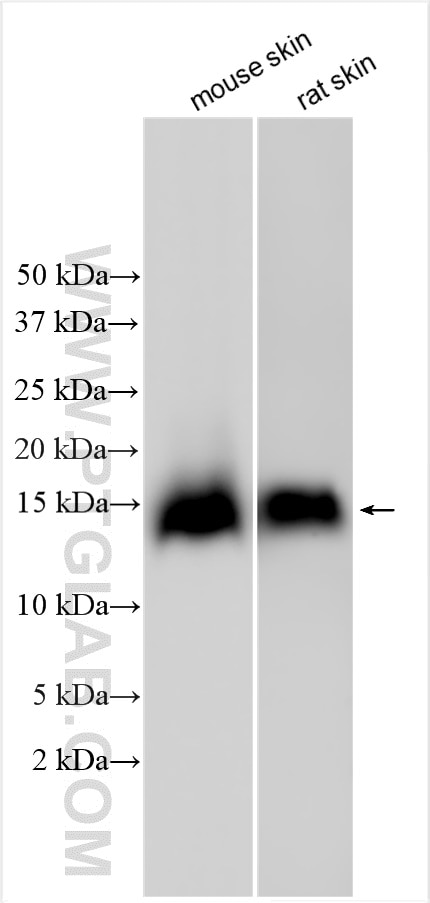Validation Data Gallery
Filter:
Tested Applications
| Positive WB detected in | mouse skin tissue, rat skin tissue |
Recommended dilution
| Application | Dilution |
|---|---|
| Western Blot (WB) | WB : 1:1000-1:4000 |
| It is recommended that this reagent should be titrated in each testing system to obtain optimal results. | |
| Sample-dependent, Check data in validation data gallery. | |
Product Information
21673-1-AP targets KRTAP3-1 in WB, ELISA applications and shows reactivity with human, mouse, rat samples.
| Tested Reactivity | human, mouse, rat |
| Host / Isotype | Rabbit / IgG |
| Class | Polyclonal |
| Type | Antibody |
| Immunogen | KRTAP3-1 fusion protein Ag16508 相同性解析による交差性が予測される生物種 |
| Full Name | keratin associated protein 3-1 |
| Calculated molecular weight | 98 aa, 11 kDa |
| Observed molecular weight | 10-15 kDa |
| GenBank accession number | BC113077 |
| Gene Symbol | KRTAP3-1 |
| Gene ID (NCBI) | 83896 |
| Conjugate | Unconjugated |
| Form | Liquid |
| Purification Method | Antigen affinity purification |
| UNIPROT ID | Q9BYR8 |
| Storage Buffer | PBS with 0.02% sodium azide and 50% glycerol{{ptg:BufferTemp}}7.3 |
| Storage Conditions | Store at -20°C. Stable for one year after shipment. Aliquoting is unnecessary for -20oC storage. |
Background Information
KRTAP3-1 is a member of the keratin-associated protein (KAP) family. The KAP proteins form a matrix of keratin intermediate filaments which contribute to the structure of hair fibers.
Protocols
| Product Specific Protocols | |
|---|---|
| WB protocol for KRTAP3-1 antibody 21673-1-AP | Download protocol |
| Standard Protocols | |
|---|---|
| Click here to view our Standard Protocols |
